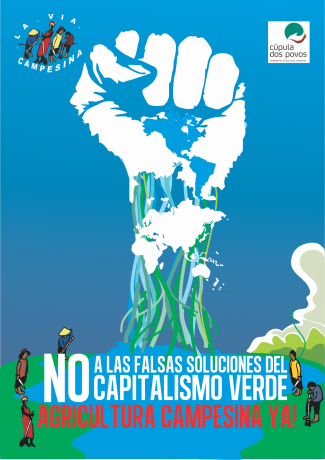Features
You are here
Rio+20

July 31, 2012
The outcome document of the UN Conference on Sustainable Development 2012 is full of words like “We recognize,” “We take note,” “We reaffirm our resolve,” and “We stress the importance of.” Missing entirely is language like, “We will.”
Known as “Rio+20,” the three-day conference was held in Rio de Janeiro on the twentieth anniversary of the first Earth Summit in that city. In the intervening twenty years carbon emissions have increased by nearly 50 percent and we have seen the effects of climate change in devastating hurricanes and typhoons, droughts, floods, heat waves, forest fires and more. In response, the world’s governments decided to do less.
No targets, no goals, no nothing
The wording of the outcome document does not commit any government to anything. There is no planned reduction of carbon emissions, no funds provided from the rich nations to aid the underdeveloped nations in improving standards of living via carbon free technologies, no development programs to aid those dispossessed by climate change, or anything else concrete. Not even some flowery phrases “affirming,” or “recognizing,” the right to a healthy environment
In place of action, the outcome document reads, “We resolve to establish an inclusive and transparent intergovernmental process on sustainable development goals that is open to all stakeholders, with a view to developing global sustainable development goals to be agreed by the General Assembly.” A committee of 30 Nations will produce these goals and present them to the General Assembly. In other words, they agreed to talk about it later.
Green Economy
The outcome document discusses three dimensions to sustainable development—social, environmental and economic. However, it is clear that economic sustainability is given the most importance. It’s also interesting that when they use the word “dimension,” in math and physics, a change in one dimension can be made without affecting the other two. There is no recognition that under capitalism economic growth always comes at a cost to our environment and our well-being.
The solution to the environmental and social problems caused by capitalism, according to the outcome document, is more capitalism. The “green economy” is to be implemented by placing a dollar value on everything. For a business, the only values are those attached to prices. So under capitalism if something has no price it literally has no value. People value fresh air, abundant oceans and forests, and the kind of stable climate that arose over the last 10,000 years. But capitalism as a system doesn’t. So their solution is to try to put prices on everything and let market speculators determine the correct price. Through the magic of the market, all of these “commodities” will now be preserved. Much the way putting a price on cod preserved the Atlantic cod fishery, or putting a price on wood preserved the forests of Europe and North America.
Human rights
“The G7 countries, the Holy See, and Canada formed a shameful alliance against making a commitment to human rights, on occasion aided by the US,” said Jan Egeland, deputy executive director at Human Rights Watch at the close of the conference.
Canada and its allies united against reaffirming the responsibility of businesses to respect rights. Governments also failed to address their human rights obligations when they sit as shareholders of international financial institutions.
The opponents of gender equality led by the Vatican, which has a seat at the UN as a Permanent Observer, were successful in removing any mention of reproductive rights from the draft outcome document. As a consequence the final version does not recognize that women’s rights are central to sustainable development. The opponents of women’s rights were clear that reproductive rights include access to abortion, which they oppose.
Explicit references to freedom of assembly, freedom of association, and freedom of speech were also removed from the draft document.
People’s Summit
While the official representatives were inside avoiding the problems of climate change and other environmental disasters, thousands met at the People’s Summit for Social and Environmental Justice in defence of the commons, against the commodification of life to propose real solutions.
On the opening day of the UN summit, tens of thousands marched in the streets to demand economic and climate justice.
The march included trade unionists from Brazil and other countries. The delegation from the Landless Peasants Movement of Brazil carried a banner that read, “no to the false solutions of green capitalism.”
The final declaration of the People’s Summit described how they saw themselves. “The People’s Summit is a symbolic moment in a new cycle of the trajectories of global struggles, giving rise to a new convergence among movements of women, indigenous peoples, Afro-descendants, youth, family and peasant farmers, workers, traditional peoples and communities, defenders of the right to cities and religions from around the world.”
Their declaration addressed issues of gender and sexual equality calling for “women’s autonomy over their own bodies and sexuality” and LGBT rights. In the same paragraph as they demand that the work of the family no longer rest mostly with women, they also called for rights to organize and bargain collectively, and the right to a social safety net.
They called for democratic control over energy production and the right to determine how energy is produced and what it is used for. In order to do this decentralized renewable energy resources need to be developed.
The People’s Summit clearly identified the cause of our many problems: “the patriarchal, racist and homophobic capitalist system.”
In this vibrant organizing model that combines street protests with workshops and debates and cultural events we can see what the solution to the climate crisis is.
“The People’s Summit strengthened our conviction that only the people, organized and mobilized, can free the world from the control of corporations and financial capital.”
The official UN Rio+20 website can be found at: http://www.uncsd2012.org
The final declaration of the People’s Summit can be found at bit.ly/T1h3x8
Section:
Topics:
- Log in to post comments









